Why Choose Microbiology and Immunology at UB?
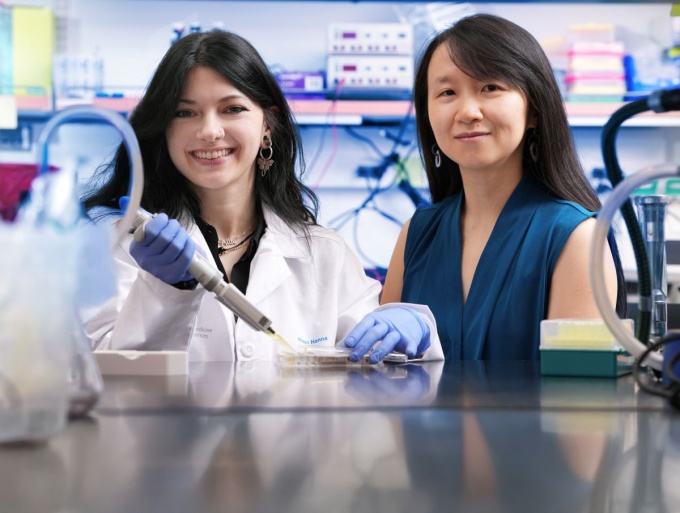
PhD student, Allison Hanna, with Yolanda Huang, PhD, whose lab uses multidisciplinary approaches including functional genomics, genetics, biochemistry, and bioinformatics to study new pathways encoded in gut bacteria and phages.
Explore problems related to the basic science of infectious disease, working with our internationally recognized faculty. Your training will be supported by our culture of mentoring, teamwork and professional development.
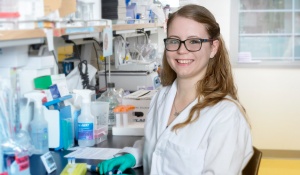
Taylor Glausen studies Toxoplasma gondii, a protozoan parasite affecting about a quarter of the world’s population.
We engage you in investigations of disease-causing microbes — including bacteria, viruses, fungi and parasites. You will contribute to a better understanding of infectious disease processes and host immune responses — knowledge that paves the way for new anti-microbial therapies and vaccines.
You will have opportunities to build expertise across disciplines, learning from researchers in infectious disease medicine, bioinformatics, cancer immunology and interrelated fields.
You will likely work in labs affiliated with the Witebsky Center for Microbial Pathogenesis and Immunology.
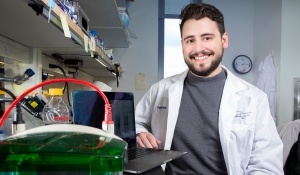
David Goich has co-authored papers published in journals such as mSphere and ImmunoHorizons.
You will build your skill set using a wide variety of modern molecular techniques — all tailored to the specific needs of your research.
As you become more independent, you will learn what techniques are available among the constantly evolving repertoire.
You will learn how to choose the best options to achieve your research aims.
We give you many opportunities to share your research findings and connect with members of our research community — from top scientists in the field to your own peers. We encourage your participation in our regional research forums and Micro Club.
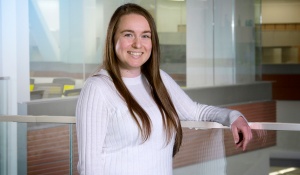
Graduate student Shaunna Richelle Simmons was first author on research about age-driven changes in neutrophil responses during pulmonary infections.
We foster a collaborative, collegial environment and are dedicated to your professional development. Our faculty will mentor you throughout your research process. We help you generate hypothesis-driven questions, write grants and scholarly papers. Beyond lab techniques, you will learn how to talk about science, engage your team members and communicate with fellow researchers.
We take pride in your contributions and reward your accomplishments with research awards.
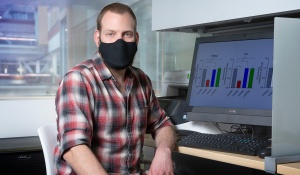
Research co-authored by doctoral student Brandon Waxman has helped shed light on the antiviral function of membrane-associated RING-CH proteins and their significance in cell intrinsic immunity.
You will work in our department facilities and faculty labs — all equipped with the tools to tackle new problems in microbiology and immunology.
You also will have access to core facilities that carry out various types of studies such as:
- genome sequencing
- gene chip microarray
- microscopy imaging
- protein analysis via robotic, high through-put crystallization screening
We believe that diversity in our faculty, students and staff provides the optimal means by which our mission and goals can be accomplished. Consequently, we are firmly dedicated in our research and academic endeavors to creating and sustaining a nurturing, inclusive and welcoming environment for all. We recognize and support the value of all forms of diversity, including gender, race, ethnicity, age, religion, language, disability, sexual orientation, veteran status and socio-economic status.
You will join a diverse community of scientists and trainees with varied cultural, personal and scientific perspectives. One of our labs, for example, includes researchers from Cameroon, Brazil, Uruguay, Bangladesh and Chicago.
We share our university and medical school’s commitment to diversity within a demanding learning environment, where excellence is valued.
We prepare you for high-demand positions in academia, top national research laboratories and industry. Our alumni have gone on to careers at universities such as Stanford, Notre Dame and UCLA; agencies including the NIH, CDC and FDA; and companies such as Abbott Labs and Hoffmann-La Roche.
Our students find their degrees open doors to broad career options, including intellectual property law, science writing and research and development.